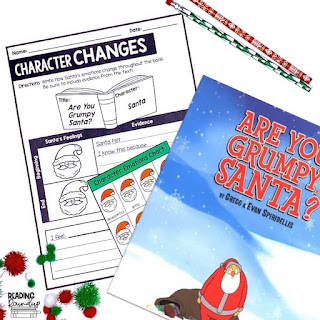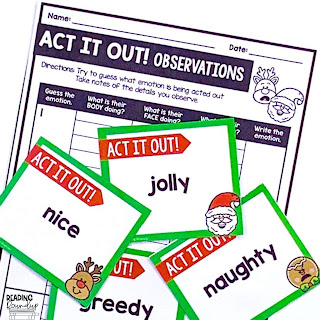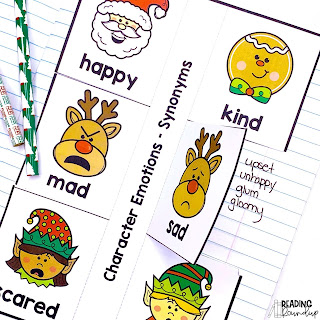One of my favorite books to read with my students in December is Are You Grumpy Santa? Not only is it a hilarious story that kids love, but there are also so many supplemental activities you can do with it. This book perfectly lends itself to exploring emotions to enhance students' vocabulary, fluency, comprehension and writing skills while reflecting on their own feelings. Continue reading to find out more about these activities!
** This post contains affiliate links.**
If you are unfamiliar with the book Are You Grumpy Santa, stop what you're doing right now and go check it out! We can all relate to the rough day Santa has when he stubs his toe, takes a cold shower, and experiences other funny mishaps!
In this FREE reading response activity, students reflect on how Santa's emotions change throughout the book. They can refer to the Character Emotions Chart to draw Santa's facial expressions based on how he was feeling. Students are also encouraged to provide text evidence to support their answers. Not only that, but students can make a connection to their own personal lives by writing about a time when they felt grumpy or happy like Santa.
Additional Activities to Analyze Character Emotions
Emotions Charades
Playing charades to act out the emotions is a fun and easy way to learn what the words mean. In this version of the game, students are allowed to talk to paint a clearer picture of how they're feeling without actually saying the emotion. For example, a student may say "My mom won't let me have a sleepover. This is the worst day ever." to demonstrate that they are feeling upset. While a student is acting out the emotion, other students should be observing them closely. They will be noticing what their face, body, and voice are doing. Paying attention to these details will help students identify emotions while reading and be able to incorporate similar types of details into their own writing.
Emotions Task Cards
Fluency is a reading skill that tends to be overlooked when providing explicit instruction to our students. The emotions task cards I use not only improve fluency, but they also build comprehension. Students can read a brief scenario to determine how a character is feeling. The character emotions charts are a beneficial tool to help students identify the emotion. Once they've figured out how the character is feeling, they will read a quote from the character using expression to reflect the emotions.
Reading Interactive Notebooks
Students record synonyms for emotions words that they find during independent reading. They can also record examples of how the author provides details to show how a character is feeling rather than just stating the emotion word. These pages become a valuable tool for students to improve their own writing with enhanced vocabulary and details about how characters are feeling.
These are just a few ways emotions can be used to enhance students' comprehension, fluency, vocabulary, and writing skills. This awareness of character feelings will make a huge impact on students' overall literacy development!
Be sure to PIN this freebie to use again next year!
Be sure to PIN this freebie to use again next year!
 |
| Click to download the FREE resource! |
 |
| Click to view the other activities mentioned! |







No comments:
Post a Comment
Leave a comment